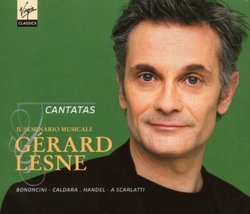| All Artists: Gérard Lesne Title: Cantatas (5 CDs) Members Wishing: 0 Total Copies: 0 Label: Virgin Classics Original Release Date: 1/1/2008 Re-Release Date: 10/28/2008 Genres: Special Interest, Pop, Classical Styles: Vocal Pop, Opera & Classical Vocal, Chamber Music, Historical Periods, Baroque (c.1600-1750), Classical (c.1770-1830), Instruments, Strings Number of Discs: 5 SwapaCD Credits: 5 UPC: 094639515325 |
Search - Gérard Lesne :: Cantatas (5 CDs)
CD Details |
CD Reviews"If Musick be the FOOD ... Giordano Bruno | Wherever I am, I am. | 11/16/2008 (5 out of 5 stars) "... on your table, this 5-CD box of musical delights may be the only nutrition anyone can afford in the current post-capitalist economic calamity. Seriously, what else can we afford? How the CD merchants can afford to produce these bargain boxes - Virgin Classics and Brilliant Classics in particular - is too subtle a question for me. One thing, of course: the share of earnings that reaches the performers wouldn't buy a slice of pizza in Positano.
All five CDs in this collection are, of course, re-releases of recordings made at various times in the 1990s, and several of them are still available as singles. Check your library for possible duplications; the CD3 Caldara, for instance, is also being sold as a 2-for-1 set along with a disk of motets by Stradella, a pairing that I reviewed some months ago, with enthusiasm. Nevertheless, even if you find yourself duplicating one or two CDs, the price for these five together is still an early Xmas present. Now then: FIVE CDs of one male alto singing Baroque cantatas? If you suppose this would be too much of a good thing, you haven't yet grasped the expressive virtuosity of Gerard Lesne. The man sings every phrase with such engagement that you forget you're listening to a singer and imagine that you're hearing a passionate human 'speaking' musically just to you. There is also an immense range of compositional resources in baroque music - a bag of tricks, if you will - which only the finest performers like Lesne can fully exploit. And just in case you suffer from a short musical attention span, the generous producers oat Virgin Classics have built in a couple of instrumental sonatas to let your ears re-set. CD1 features five short cantatas by French composers, clearly acknowledging their indebtedness to the Italian masters: Du Boisson, Clerambault, Corbois, Bernier, and Stuck. It's fun to hear Lesne sing his native language for a change, and the character of that language is the soul of its musical expression: plaintive, pensive, ever slightly more worldly and cynical than Italian. Naturally, minor keys and stately rhythms prevail. CD2 belongs to Alessandro Scarlatti, the most cerebral of Baroque composers, whose music bears the closest listening in terms of compositional wiles and whimsies. Lesne is joined for two of Scarlatti's most operatic secular cantatas by soprano Sandrine Piau, whose voice and technique are the optimal match for Lesne's. CD3 features the tempestuous music of Antonio Caldara, from the rage of Medea in Corinto to the rapture of Vicino a un rivoletto. Two chamber sonatas by Caldara, performed by vionists Ryo Terakado and Bernadette Charbonnier, buffer the emotional extremes of Caldara's cantatas. Giovanni Bononcini, on CD4, comes the closest to a purely galante music of broad simplicity. My own favorite composition on this CD is not one of the four pastoral cantatas but rather the Cello Sonata in A minor, played by cellist Bruno Cocset. The continuo on this CD is also of special merit, including both archlute and theorbo, providing a kind of complexity of texture that the straight-ahead melodies of Bononcini demand. And then there's CD5: GF Handel at his height of Italian exuberance and vocal virtuosity, the excitement magnified by brilliant obbligato writing for flutes, oboe, and violin. Lesne digs down into his reserves of adrenalin for Handel, charging even the most foursquare passagework with luxuriant vocal timbres. Thus you have Scarlatti for subtlety, Caldara for drama, Bononcini for graciousness, and Handel for inventiveness. Who needs food when music is almost free?" |

